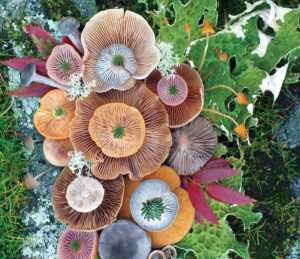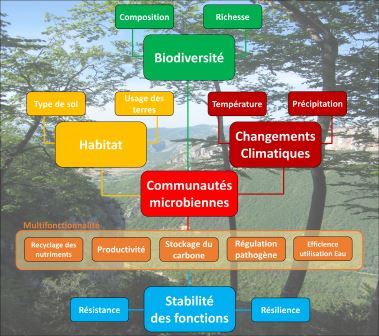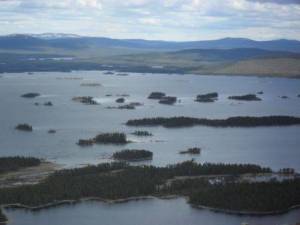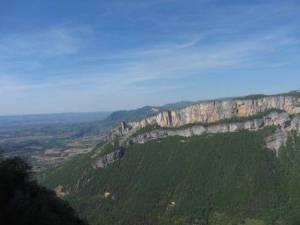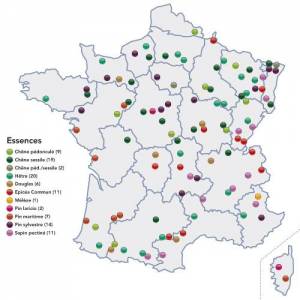INRA Centre de Bordeaux Aquitaine
71 avenue E. Bourlaux
CS 20032 33882 Villenave d'Ornon cedex
05 57 12 25 16
nicolas.fanin@inra.fr
Education and experience
•2017: Researcher INRA, Department Forest, Grassland and Freshwater Ecology, Bordeaux-France.
•2015-2016: Postdoctoral position, Department of Forest Ecology and Management, Swedish University of Agricultural Sciences (SLU), Umeå-Sweden. How are plant species and functional group effects on ecosystem properties mediated by environmental context.
•2013-2014: Postdoctoral position, Department of Environment and Agronomy, INRA, Reims-France. Functional role of microbial communities during litter decomposition across contrasting land use.
2009-2012: PhD thesis, Centre d’Ecologie Fonctionnelle et Evolutive, CNRS, Montpellier-France. Silver medal 2014 “Young Researcher” from the French Academy of Agriculture, Alimentation & Environment. Influence of litter quality on microbial functioning in tropical rainforest
Research and skills
My research interests focus on the fine-scale biochemical mechanisms that give rise to patterns in large-scale ecosystem processes.
I am particularly interested in the role of biodiversity, habitat and climate change on microbial communities (fungi / bacteria), and in turn, on the multifunctionality of terrestrial ecosystems and the coupling between cycles of carbon (C), nitrogen (N) and phosphorus (P). The main challenge of my research is to identify the mechanisms by which biodiversity loss and climate fluctuations affect the stability of soil functions, and thus the provision of ecosystem goods and services essential for human well-being. My research intersects the fields of functional ecology, chemistry, community ecology and microbial ecology.
Ongoing projects
• Project VR (Swedish Research Council) - Context-dependency of biodiversity effects.
In partnership with the Swedish University of Agriculture in Uppsala and Umeå and CSIRO in Glen Osmond, Australia, I address the question of how the environmental context influences the effects of biodiversity loss on ecosystem processes. To do this, we use a gradient of 30 islands (each being an independent ecosystem), collectively representing a chronosequence of boreal islands over 5000 years. Different species (blueberry, lingonberry ...) and functional groups of plants (moss, tree, shrub ...) have been removed for more than 20 years to simulate a loss of biodiversity in each of these islands. The goal of this project is to identify the mechanisms by which plant diversity influences soil functioning and biogeochemical cycling across contrasting ecosystems.
• Project Dipticc (Agence Nationale de la Recherche) - Diversity and Productivity of Trees in the context of Climate Change
In partnership with Bordeaux Sciences Agro, BIOGECO (Bordeaux), EEF (Nancy) and CEFE (Montpellier), the objective of this project is to assess if tree diversity can mitigate the negative effect of climate changes on productivity and soil functioning. To do this, we use two experimental sites: ORPHEE in which more than 25000 trees of 5 local species were planted under all possible conditions; BIOPROFOR which consists of six natural sites in the Alps in which tree species are studied at different levels of elevation. The main objective of the project is to test if multispecific stands are more stable (resistant / resilient) to drought than monospecific stands. In particular, we study soil functioning through roots, mycorrhizal fungi and their impact on the availability of nutrients and carbon.
•Project TeaTime4Science - Can drinking tea help us understand climate change?
The goal of this large-scale participatory project is to bury green and red tea bags and retrieve them three months later to measure decomposition rates. In partnership with the ONF and the RENECOFOR network, more than 1200 tea bags were burried in more than 100 forest sites in France. The results of this project will help to understand what are the main factors influencing the decomposition process at large spatial scales (climate, tree species, geology…). In addition, these data will enter a global database to better understand the role of climate on the decay of organic matter.
Teaching and scientific activities
- Bordeaux Sciences Agro: Lecturer - Soil science, microbial ecology.
- University of Bordeaux (Master degrees): Functional ecology, soil ecology, forest ecology.
- Reviewer > 15 journals, associate editor in Frontiers in Forests & Global Change, section Forest soils.
Publications
Lin, D., Yang, G., Dou, P., Qian, S., Zhao, L., Yang, Y., & Fanin, N. (2020). Microplastics negatively affect soil fauna but stimulate microbial activity: insights from a field-based microplastic addition experiment. Proceedings of the Royal Society B, 287(1934), 20201268.
Press communication on microplastics
Fanin, N., Alavoine, G., & Bertrand, I. (2020). Temporal dynamics of litter quality, soil properties and microbial strategies as main drivers of the priming effect. Geoderma, 377, 114576.
Maxwell, T. L., Augusto, L., Bon, L., Courbineau, A., Altinalmazis-Kondylis, A., Milin, S., ... & Fanin, N. (2020). Effect of a tree mixture and water availability on soil nutrients and extracellular enzyme activities along the soil profile in an experimental forest. Soil Biology and Biochemistry, 107864.
Lin, D., Dou, P., Yang, G., Qian, S., Wang, H., Zhao, L., ... & Fanin, N. (2020). Home‐field advantage of litter decomposition differs between leaves and fine roots. New Phytologist 227: 995–1000.
Fanin, N., Bezaud, S., Sarneel, J. M., Cecchini, S., Nicolas, M. & Augusto, L. (2019) Relative importance of climate, soil and plant functional traits during the early decomposition stage of standardized litter. Ecosystems.
Lin, D., Yang, S., Dou, P.,Wang, H., Wang, F., Qian, S., Yang, G., Zhao, L., Yang, Y. & Fanin, N. (2019). A plant economics spectrum of litter decomposition among coexisting fern species in a subtropical forest. Annals of botany 125, 145–155.
Wardle, D.A., Gundale, M. J., Kardol, P., Nilsson, M.C. & Fanin, N. (2019) Impact of plant functional group and species removals on soil and plant nitrogen and phosphorus across a retrogressive chronosequence. Journal of ecology 00,1–13.
Lin, D., Wang, F., Fanin, N., Pang, M., Dou, P., Wang, H., Qian, S., Zhao, L., Yang, Y., Mi, X. & Ma. K. (2019) Soil fauna promote litter decomposition but do not alter the relationship between leaf economics spectrum and litter decomposability. Soil Biology and Biochemistry 136, 107519.
Augusto, L., Fanin, N. & Bakker, M. R. (2019). When plants eat rocks: Functional adaptation of roots on rock outcrops. Functional Ecology, 33 (5), 760-761.
Fanin, N., Kardol, P., Farrell, M., Kempel, A., Ciobanu, M., Nilsson, M.-C., Gundale, M. J. & Wardle, D.A. (2019). Effects of plant functional group removal on structure and function of soil communities across contrasting ecosystems. Ecology Letters, 22 (7)1095-1103.
Sauvadet, M., Fanin, N., Chauvat, M., & Bertrand, I. (2019). Can the comparison of above-and below-ground litter decomposition improve our understanding of bacterial and fungal successions? Soil Biology and Biochemistry 132, 24-27.
Fanin, N., Kardol, P., Farrell, M., Nilsson, M.-C., Gundale, M.J. & Wardle, D.A. (2019). The ratio of Gram-positive to Gram-negative bacterial PLFA markers as an indicator of carbon availability in organic soils. Soil Biology and Biochemistry 108, 111-114.
Lin, D., Pang, M., Fanin, N., Wang, H., Qian, S., Zhao, L. et al. (2019). Fungi participate in driving home-field advantage of litter decomposition in a subtropical forest. Plant and Soil 434, 467–480.
Kardol, P., Fanin, N. & Wardle D. (2018). Long-term effects of species loss on community properties across contrasting ecosystems. Nature 557, 710–713.
Press communication on biodiversity
Interview France Inter, La Science de l’environnement dans « La Tête au carré ».
Fanin, N., Gundale, M.J., Farrell, M., Ciobanu, M., Baldock, J.A., Nilsson, M.-C, Kardol, P. & Wardle D.A. (2018). Consistent effects of biodiversity loss on multifunctionality across contrasting ecosystems. Nature Ecology & Evolution 2, 269–278.
Press communication on multifunctionality
Fanin, N., Fromin, N., Barantal, S. & Hättenschwiler, S. (2017). Stoichiometric plasticity of microbial communities is similar between litter and soil in a tropical rainforest. Scientific Reports, 7, 12498.
Schneider A.R., Gommeaux M., Duclercq J., Fanin, N., Conreux A. et al. (2017). Response of bacterial communities to Pb smelter pollution in contrasting soils. Science of the Total Environment 605, 436-444.
Fanin, N., Fromin N. & Bertrand I. (2016) Functional breadth and home-field advantage generate functional differences among soil microbial decomposers. Ecology 97, 1023–1037.
Fanin, N., Moorhead, D. & Bertrand, I. (2016). Eco-enzymatic stoichiometry and enzymatic vectors reveal differential C, N, P dynamics in decaying litter along a land-use gradient. Biogeochemistry 129, 21-36.
Fanin, N., Hättenschwiler S., Chavez P. & Fromin N. (2016) Asynchronous availability of N and P regulates the activity and structure of the microbial decomposer community. Frontiers in Microbiology 6, doi: 10.3389/fmicb.2015.01507.
Fanin, N.& Bertrand, I. (2016) Aboveground litter quality is a better predictor than belowground microbial communities when estimating carbon mineralization along a land-use gradient. Soil Biology and Biochemistry 94, 48–60.
Sauvadet M., Chauvat M.,Fanin, N., Coulibaly S. & Bertrand, I. (2016) Comparing the effects of litter quantity and quality on soil biota structure and functioning: Application to a cultivated soil in Northern France. Applied Soil Ecology 107, 261-271.




